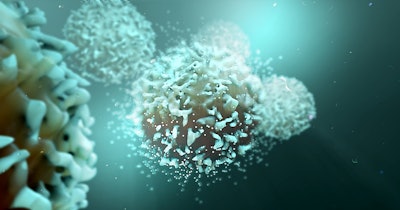
The generation of “remarkable” results in lupus patients has sparked speculation about the potential for chimeric antigen receptor T-cell (CAR-T cell) therapy to cure autoimmune diseases.
On Thursday, the New England Journal of Medicine published data on 15 patients who each received one infusion of a CD19-directed CAR-T cell therapy. Similar therapies, such as Gilead Sciences’ Yescarta, are already approved for blood cancers. Because CD19 is expressed on B cells, a type of white blood cell that is implicated in autoimmunity, researchers speculated that the approach may work in diseases such as lupus. Deep depletion of B cells by anti-CD20 antibodies is associated with improved outcomes.
The NEJM paper provides the closest look yet at a study that has provided early validation of the use of CAR-T therapies to deplete B cells and treat autoimmune diseases. The study enrolled 15 participants, eight with systemic lupus erythematosus (SLE), four with systemic sclerosis, and three with idiopathic inflammatory myositis.
After a median of 15 months of follow-up, all subjects were in remission or had had major reductions in symptoms and had stopped taking immunosuppressive and anti-inflammatory medications. All eight SLE patients were in remission, having had severe progressive disease that was resistant to at least two standard immunomodulating treatments at baseline.
In an accompanying editorial, Newcastle University’s Dr. John Isaacs, PhD, said the improvements in patients with serious multisystem disease “are remarkable.” Autologous stem-cell transplantation can achieve similar outcomes, Isaacs said, “but with a risk of substantial toxic effects and even death.”
The CAR-T therapy was well-tolerated. Eleven participants had cytokine release syndrome, a known side effect of CAR-T therapy, but 10 of the cases were very mild grade 1 events. The other case was grade 2. Immune effector cell–associated neurotoxicity syndrome, another known side effect, was only seen in one patient and that case was grade 1.
Maintaining a tolerable safety profile will be critical to the expansion of CAR-T into autoimmune disease. Isaacs believes the benefit-to-risk ratio seen in the study “is likely to prove acceptable to both physician and patient, at least in certain cases of refractory disease.” The tolerance for risk will decline if CAR-T development expands from life-threatening SLE into patients with earlier, easier-to-manage disease.
Reports of T-cell malignancies in cancer patients who received CD19-directed CAR-T cell therapies are another concern. The potential causes of the cases, which led the U.S. Food and Drug Administration (FDA) to order new warning information, could apply to the use of CAR-T therapies in autoimmune diseases.
Even so, the potential of the approach has attracted multiple drug developers. Since the publication in September 2022 of data on the first five SLE patients enrolled in the study, companies including Bristol Myers Squibb and Novartis have begun testing CD19-directed CAR-T therapies in lupus patients.
















